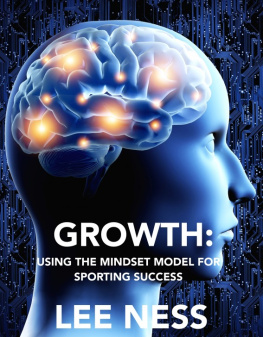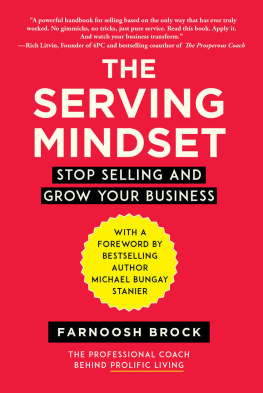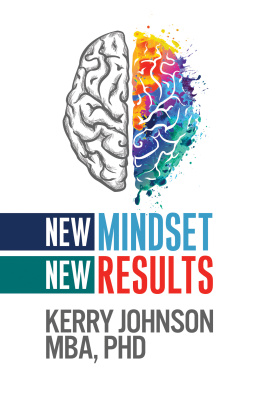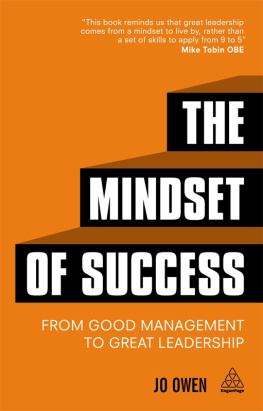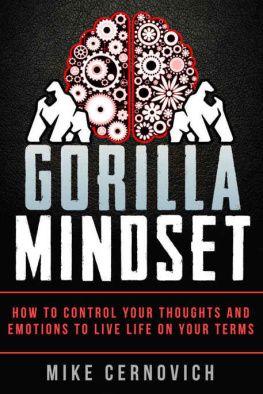MINDSET
and
EMOTIONS
Learn How to Use Your Mind to Control Your Feelings
Faith P. Blake
Copyright 2019 All Rights Reserved
This book is copyright protected, and is intended for personal use only. No parts of this publication may be reproduced in any form or by any means, including printing, scanning, photocopying, or otherwise unless explicitly stated. Any attempts to amend, sell, distribute, paraphrase, or quote the contents of this book, without the consent of the author or copyright owner can and will result in legal action. Please note that the details included within this book are for informational purposes only. The publisher and author have made every effort to ensure the accuracy of the information contained within this book. However, they make no warranties as to the completeness of the contents herein, and hence hereby declaim any liability for errors, omissions, or contrary interpretation of the subject matter. The information contained cannot be considered a substitute for treatment as prescribed by a therapist or other professional. By reading this book, you are assuming all risks associated with using the advice, data, and suggestions given below, with a full understanding that you, solely, are responsible for anything that may occur as a result of putting this information into action in any way regardless of your interpretation of the advice.
TABLE OF CONTENTS
INTRODUCTION
CAN THE MIND REALLY CONTROL EMOTIONS?
The human emotion is a very influential force our makeup. This ever-present force can be both helpful and painful to us. We experience different situations daily as humans. Whether we are taking an early morning walk, trying to win a new client over at work, just received a piece of news worth celebrating or taking a financial hit, or even the death of a loved one. These situations bring about different reactions when they take place. This is aided by the release of neurotransmitters.
Feelings or emotions are triggered responses to situations. They are naturally linked to our flight or fight instincts that are inborn. We cry whenever we feel pain, we make sacrifices for love and take chances as a result of optimism over a prospect we envisage. As different situations produce different reactions, it is ideal to expect both sides of the coin. We react differently to the situations we experience, either in a proper manner or out of line. This can prove to be costly both to ourselves and our relationship with others. Reacting well to situations is undoubtedly beneficial and cannot be simply overlooked.
The conscious and the subconscious are two levels of our thought process i.e. the mind. The latter has been researched to be more aware than the former. Its capacity to retain information from our senses which are the centers of taking in information is extremely high. Data from the five sense organs are seamlessly captured and stored by the subconscious mind. As influential as this level of the mind is in the projection of emotions, it is rarely accessed. To have control of the one's feelings, it is imperative to access the subconscious as well as the surface conscious part of the mind. You will go on to learn how to do so as you read on.
Generally, the control means influencing something or having a measure of power over it. Control in this context is a learned skill. It refers to the ability to discipline thoughts, feelings, and emotions. As it does not come naturally, control must be learned. So, how do control your feelings using the mind?
Knowledge is power! It brings about control. To learn to control one's feelings with the mind, it important, as a matter of fact, to understand the different concepts surrounding the mind and the human feelings. You will be in a better position to control your feelings and emotions after gaining this knowledge.
This book goes on to highlight key areas, that will help any individual applying its method to go on to achieve total control of the emotions. It discusses the mind and emotions, their relationship and how they work in tandem.
Our feelings can alternate between volatile extremes. When it is steered extremely to the right, we find ourselves in a state of euphoria and when it veers extremely to the left, it bothers on rage. Love, ecstasy, excitement are examples of positive feelings which should be encouraged. Rage, bitterness, hate, envy are some negative emotions which can spiral uncontrollably when triggered, hence leading to havoc. To attain moderation, putting things in the right perspective and handling negative emotions to the best degree, control is a must.
To learn how to you use the mind to control your feelings, it is important to first understand the mind, and how feelings work. The next chapter brings this to the fore.
CHAPTER 1
THE RELATIONSHIP BETWEEN THE MIND AND YOUR FEELINGS
Philosophers and scientists have strived to grasp the full workings of the mind and feelings for ages. Different theories have been proposed to discuss the workings of the mind, how it is interconnected with emotions and feelings. It may be surprising to see emotions and feelings mentioned apart, no need to worry, it will be fully explained in the second section of this part. An indisputable point that will form the underlying theme of this section is that the mind, feelings, and emotions are all mental states that affect our actions in speech or deed. It goes as far as affecting our creativity or the curtailing of it. To know how to make the most of your situation and manage the ups and downs, the relationship of the mind and your feelings need to be understood. This section discusses the mind and feelings independently. It further goes on to relate them in a bid to help you learn to take charge of your feelings using the mind. When an individual is asked to recount a deep and painful experience, some parts of it may well be recollected, but not all. Why is this so? What houses such repressed mental contents and do they influence our actions? You will be primed to find out the answers to these questions when you fully understand the working of the mind. Improved self-worth, reduced emotional upheaval and a better position to attain goals in life are some benefits associated with gaining control of the mind. Knowledge of the mind is the first step needed in controlling it.
So what exactly do you need to know about the mind?
1.1. What you should know about the mind
The first step to changing your world is changing your mindset. How can go about changing your mindset if you do not even understand how the mind basically works and why there is a need to take charge of it and change it?
One of the most complex things in the universe is the human brain. You do not need to be a philosopher, neuroscientist or a brain surgeon to care about how it performs its functions. The brain can be likened to a self-operating computer in the human skull, controlling all our activities. Similar to a computer's hardware, it consists of memory, power connections, processing power, storage and wiring which are all needed in carrying our daily human tasks. The computer is made of both hardware and software. Just as the brain has been compared to the hardware components of a computer's system, the mind pictures the software part. It functions as the operating system, gathering, managing and storing information. It uses the brain's resources to process data. As the computer system is inoperable when the hardware and software components are separated from each other. This also applies to the brain and mind. They make up the same entity and cannot operate in isolation.
About a hundred billion neurons or nerve cells found in the human brain forms the central nervous system (CNS). These nerve cells receive and transmit electrochemical signals. These signals are your emotions, thoughts, actions and the reflexes undergone by the body. It is the mind that generates the thought, that remains a fact in the midst of all the ongoing research surrounding it.
Next page

